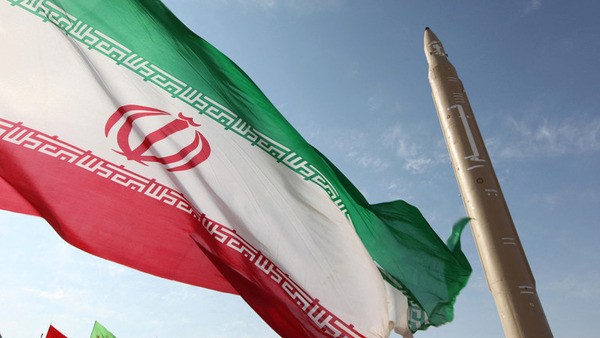The Death of Hamas Leader Yahya Sinwar: What We Know So Far
Israel and the US claim intelligence provided Sinwar’s whereabouts, but this is doubtful.
Loading...

Exploring Iran’s Stance on Nuclear Arms Amid Regional Tensions
For a long time, there have been claims that the Islamic Republic of Iran is attempting to develop a powerful nuclear bomb. But what do the country's leaders actually want?
Kamal Kharazi, an advisor to Iran’s leader, stated that Iran might reconsider its stance on nuclear weapons if Israel poses a threat to Iran's survival.
If Israel attacks Iran's nuclear facilities, Iran may decide to pursue nuclear weapons. Iran's leaders are considering changing their nuclear policy if they feel threatened.
Kharazi referenced a ruling by a religious leader in Iran, which states that it is not permissible to develop nuclear weapons. Despite this, some politicians in Iran believe that having nuclear weapons could be beneficial for national security.
Opinions among those close to Khamenei vary on this issue. Iran’s religious leaders argue that for religious, political, and strategic reasons, it is crucial not to develop nuclear weapons. They believe that if Iran acquires nuclear weapons, other regional countries like Turkey, Saudi Arabia, Egypt, and the UAE might also pursue them, potentially leading to a dangerous arms race. Israel, which is nearby, might feel threatened and could take action.
Israeli officials do not confirm whether they possess nuclear weapons, but many experts believe they do.
Iranian leaders prefer to use their nuclear program for peaceful purposes rather than for weapons development. Creating and maintaining nuclear weapons would be costly, and Iran is already facing financial challenges due to international sanctions. Therefore, they prefer to allocate resources to more urgent needs.
Some Iranian leaders believe that possessing a nuclear bomb would ensure national security and prevent a large-scale war with Israel. They argue that the world is changing and old rules no longer apply, hence Iran should consider becoming a nuclear power.
The debate centers around whether it is acceptable for Tehran to develop nuclear weapons and if they have the right to do so.
Iran is permitted to develop nuclear energy for peaceful purposes under a treaty it signed, which other countries have agreed to support.
However, Iran sometimes argues that Western countries are preventing it from using nuclear energy for peaceful purposes, which has led to threats of withdrawing from the treaty.
Due to ongoing disagreements with the West, Iran has asserted its right to develop nuclear weapons for self-defense. The West suspects Iran of trying to build a nuclear bomb, which complicates the situation.
The International Atomic Energy Agency (IAEA) and its leader, Rafael Grossi, have made statements that exacerbate tensions. Some former intelligence officials from the US and Europe suggest that Iran is covertly funding its nuclear weapons program.
US officials have stated that Iran has diluted some of its enriched uranium to avoid conflict with the West. However, reports indicate that Iran is rapidly producing enriched uranium and now possesses more nuclear fuel, raising questions about its intentions.
Grossi visited Iran to discuss ensuring compliance with nuclear program regulations. While initial discussions were positive, no agreement on specific actions was reached.
Grossi later reported that Iran is willing to engage in serious talks with the IAEA. He also confirmed that there is no evidence suggesting Iran is developing or plans to develop nuclear weapons.
Iran has mixed feelings about Grossi, sometimes viewing him as fair and other times as influenced by the US.
Since Grossi joined the IAEA, the agency’s focus has shifted towards political and personal agendas, leading Iranian media to sometimes mock it as the "American Atomic Energy Agency."
Tehran has agreed to allow IAEA inspectors to visit its nuclear facilities, a change from previous refusals that had raised concerns about weapon development. They aim to comply with regulations through an established agreement.
Both conservative and reformist leaders in Iran agree on returning to the Iran nuclear deal, ensuring that any new agreement protects Iran’s rights and interests.
Iran seeks a written commitment from the US to prevent a repeat of the 2018 withdrawal from the deal. While the Biden administration attempted to negotiate a new deal, it was unsuccessful, and future US-Iran relations remain uncertain, especially with potential changes in US leadership.
Iran is striving to formulate a strategy that ensures its security without causing regional conflicts.
Iran recognizes the dangers of becoming a dominant nuclear power in the region but also cannot afford to be defenseless. Recent events have reinforced Iran's focus on border security.
Iran fears that a potential Trump return to power could lead to a major war in the Middle East, possibly involving Iran. They believe Trump's current support for Israel is politically motivated and worry Israel might escalate tensions after the election.
The ongoing issue of Iran’s nuclear program remains unresolved and contentious. Iranian leaders are divided on the approach, while other countries urge Iran to dismantle its nuclear weapons and refrain from further development.
The West and Israel are concerned that Iran’s nuclear capabilities could allow it to dominate the Middle East and make territorial demands, significantly increasing its regional power. Iran has expressed a desire to expand its influence in the Middle East.
Iran possesses advanced nuclear technology compared to other Islamic countries in the Middle East. They prioritize national security over economic gains from the West by maintaining their nuclear program. Although they may not currently aim to develop nuclear weapons, they will take necessary actions if they feel threatened.
A country with a long history like Iran will avoid conflict with severe consequences. Iran’s involvement in organizations aligned with Russia and China indicates its strategic alliances, making its nuclear intentions unclear.
BMM - MBA
Israel and the US claim intelligence provided Sinwar’s whereabouts, but this is doubtful.
Tata, who passed away on Wednesday, was known for his humility and his expansive vision.
Israel says the major attacks that levelled multiple residential buildings in southern Beirut targeted Hezbollah’s ‘central command’.
